Wendell Berry
Appearance
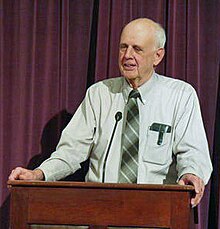
because I speak in praise
of gentleness, or elegant
because I honor the grace
that keeps this world. I am
a man crude as any,
gross of speech, intolerant,
stubborn, angry, full
of fits and furies. That I
may have spoken well
at times, is not natural.
A wonder is what it is.
Wendell Berry (born 5 August 1934) is an American philosopher, poet, essayist, farmer, novelist and social activist.
Quotes
[edit]




- I come into the presence of still water.
And I feel above me the day-blind stars
waiting with their light. For a time
I rest in the grace of the world, and am free.- "The Peace of Wild Things" in Green River Review, No. 1 (1968)
- I am speaking of the life of a man who knows that the world is not given by his fathers, but borrowed from his children; who has undertaken to cherish it and do it no damage, not because he is duty-bound, but because he loves the world and loves his children; whose work serves the earth he lives on and from and with, and is therefore pleasurable and meaningful and unending; whose rewards are not deferred until "retirement," but arrive daily and seasonally out of the details of the life of their place; whose goal is the continuance of the life of the world, which for a while animates and contains them, and which they know they can never compass with their understanding or desire.
- The Unforeseen Wilderness : An Essay on Kentucky's Red River Gorge (1971), p. 33; what is likely a paraphrase of a portion of this has existed since at least 1997, and has sometimes become misattributed to John James Audubon: A true conservationist is a man who knows that the world is not given by his fathers, but borrowed from his children.
- It is impossible to care for each other more or differently than we care for the earth.
This last statement becomes obvious enough when it is considered that the earth is what we all have in common, that it is what we are made of and what we live from, and that we therefore cannot damage it without damaging those with whom we share it. But I believe it goes farther and deeper than that. There is an uncanny resemblance between our behavior toward each other and our behavior toward the earth. Between our relation to our own sexuality and our relation to the reproductivity of the earth, for instance, the resemblance is plain and strong. By some connection we do not recognize, the willingness to exploit one becomes the willingness to exploit the other.- The Unsettling of America (1977), Chapter Seven : The Body and the Earth
- Today, local economies are being destroyed by the "pluralistic," displaced, global economy, which has no respect for what works in a locality. The global economy is built on the principle that one place can be exploited, even destroyed, for the sake of another place.
- Interview in New Perspectives Quarterly (1992), quoted in his Profile at The Poetry Foundation
- Once plants and animals were raised together on the same farm — which therefore neither produced unmanageable surpluses of manure, to be wasted and to pollute the water supply, nor depended on such quantities of commercial fertilizer. The genius of America farm experts is very well demonstrated here: they can take a solution and divide it neatly into two problems.
- The Unsettling of America : Culture & Agriculture (1996), p. 62
- Whether we and our politicians know it or not, Nature is party to all our deals and decisions, and she has more votes, a longer memory, and a sterner sense of justice than we do.
- The line that connects the bombing of civilian populations to the mountain removed by strip mining … to the tortured prisoner seems to run pretty straight. We're living, it seems, in the culmination of a long warfare — warfare against human beings, other creatures and the Earth itself.
- We Americans are not usually thought to be a submissive people, but of course we are. Why else would we allow our country to be destroyed? Why else would we be rewarding its destroyers? Why else would we all — by proxies we have given to greedy corporations and corrupt politicians — be participating in its destruction? Most of us are still too sane to piss in our own cistern, but we allow others to do so and we reward them for it. We reward them so well, in fact, that those who piss in our cistern are wealthier than the rest of us.
How do we submit? By not being radical enough. Or by not being thorough enough, which is the same thing.
- We need to confront honestly the issue of scale. Bigness has a charm and a drama that are seductive, especially to politicians and financiers; but bigness promotes greed, indifference, and damage, and often bigness is not necessary. You may need a large corporation to run an airline or to manufacture cars, but you don't need a large corporation to raise a chicken or a hog. You don't need a large corporation to process local food or local timber and market it locally.
- "Compromise, Hell!"
- “There’s nothing under the ground that’s worth more than the little layer of topsoil sitting on top of it.”
- I'm not a Baptist in any formal way. I go to the Baptist church, where my wife plays the piano, on days of bad weather. On days of good weather, I ramble off into the woods somewhere. I am a person who takes the Gospel seriously, but I have had trouble conforming my thoughts to a denomination.
The Long-Legged House (1969)
[edit]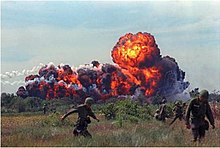
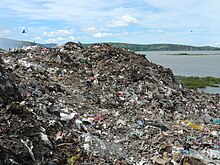

- When the possessions and households of citizens are no longer honored by the acts, as well as the principles, of their government, then the concentration camp ceases to be one of the possibilities of human nature and becomes one of its likelihoods.
- "The Landscaping of Hell : Strip-Mine Morality" (1965)
- The rule, acknowledged or not, seems to be that if we have great power we must use it. We would use a steam shovel to pick up a dime. We have experts who can prove there is no other way to do it.
- "The Loss of the Future"
- A community is the mental and spiritual condition of knowing that the place is shared, and that the people who share the place define and limit the possibilities of each other's lives. It is the knowledge that people have of each other, their concern for each other, their trust in each other, the freedom with which they come and go among themselves.
- "The Loss of the Future"
- We have become blind to the alternatives to violence. This involves us in a sort of official madness, in which, while following what seems to be a perfect logic of self-defense and deterrence, we commit one absurdity after another: We seek to preserve peace by fighting a war, or to advance freedom by subsidizing dictatorships, or to "win the hearts and minds of the people" by poisoning their crops and burning their villages and confining them in concentration camps; we seek to uphold the "truth" of our cause with lies, or to answer conscientious dissent with threats and slurs and intimidations. … I have come to the realization that I can no longer imagine a war that I would believe to be either useful or necessary. I would be against any war.
- Wars have never made peace or preserved it or fostered its ideals. To have peace you must make peace with your enemy. To make peace only with your friends is to avoid the issue, and to permit a great principle to become absurd. Far from making peace, wars invariably serve as classrooms and laboratories where men and techniques and states of mind are prepared for the next war.
- "A Statement against the War in Vietnam"
- If I solve my dispute with my neighbor by killing him, I have certainly solved the immediate dispute. If my neighbor was a scoundrel, then the world is no doubt better for his absence. But in killing my neighbor, though he may have been a terrible man who did not deserve to live, I have made myself a killer — and the life of my next neighbor is in greater peril than the life of the last. In making myself a killer I have destroyed the possibility of neighborhood.
- "A Statement against the War in Vietnam"
- We haven't accepted — we can't really believe — that the most characteristic product of our age of scientific miracles is junk, but that is so. And we still think and behave as though we face an unspoiled continent, with thousands of acres of living space for every man. We still sing "America the Beautiful" as though we had not created in it, by strenuous effort, at great expense, and with dauntless self-praise, an unprecedented ugliness.
- "The Rise"
- We have lived by the assumption that what was good for us would be good for the world. ... We have been wrong. We must change our lives, so that it will be possible to live by the contrary assumption that what is good for the world will be good for us. . . We must recover the sense of the majesty of the creation and the ability to be worshipful in its presence. For it is only on the condition of humility and reverence before the world that our species will be able to remain in it.
- "A Native Hill"
A Continuous Harmony (1972)
[edit]
- Individualism is going around these days in uniform, handing out the party line on individualism.
- "Think Little"
- Our model citizen is a sophisticate who before puberty understands how to produce a baby, but who at the age of thirty will not know how to produce a potato.
- "Think Little"
- We need better government, no doubt about it. But we also need better minds, better friendships, better marriages, better communities.
- "Think Little"
What Are People For? (1990)
[edit]


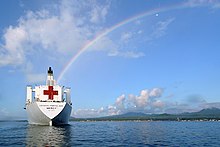
- An art that heals and protects its subject is a geography of scars.
- "Damage"
- The more local and settled a culture, the better it stays put, the less the damage. It is the foreigner whose road of excess leads to a desert … a man with a machine and inadequate culture … is a pestilence. He shakes more than he can hold.
- "Damage"
- Novelty is a new kind of loneliness.
- "Healing"
- The teachers are everywhere. What is wanted is a learner.
- "Healing"
- We are living even now among punishments and ruins.
- "A Few Words in Favor of Edward Abbey"
- A teacher's major contribution may pop out anonymously in the life of some ex-student's grandchild. A teacher, finally, has nothing to go on but faith, a student nothing to offer in return but testimony.
- "Wallace Stegner and the Great Community"
- We are living in the most destructive and, hence, the most stupid period of the history of our species.
- "A Poem of Difficult Hope"
- Much protest is naive; it expects quick, visible improvement and despairs and gives up when such improvement does not come. Protesters who hold out for longer have perhaps understood that success is not the proper goal. If protest depended on success, there would be little protest of any durability or significance. History simply affords too little evidence that anyone's individual protest is of any use. Protest that endures, I think, is moved by a hope far more modest than that of public success: namely, the hope of preserving qualities in one's own heart and spirit that would be destroyed by acquiescence.
- "A Poem of Difficult Hope"
- What we do need to worry about is the possibility that we will be reduced, in the face of the enormities of our time, to silence or to mere protest.
- "A Poem of Difficult Hope"
- Poetry can be written only because it has been written.
- "The Responsibility of the Poet"
- Professional standards, the standards of ambition and selfishness, are always sliding downward toward expense, ostentation, and mediocrity. They tend always to narrow the ground of judgment. But amateur standards, the standards of love, are always straining upward toward the humble and the best. They enlarge the ground of judgment. The context of love is the world.
- "The Responsibility of the Poet"
- The ecological teaching of the Bible is simply inescapable: God made the world because He wanted it made. He thinks the world is good, and He loves it. It is His world; He has never relinquished title to it. And He has never revoked the conditions, bearing on His gift to us of the use of it, that oblige us to take excellent care of it.
- "God and Country"
- Rats and roaches live by competition under the laws of supply and demand; it is the privilege of human beings to live under the laws of justice and mercy.
- "Economy and Pleasure"
- Eating is an agricultural act.
Sex, Economy, Freedom & Community (1993)
[edit]
- The most alarming sign of the state of our society now is that our leaders have the courage to sacrifice the lives of young people in war, but have not the courage to tell us that we must be less greedy and less wasteful.
- "Peaceableness Toward Enemies"
- It is wrong to condemn people for doing a thing and then offer no alternative but failure. A person could get mad about that.
- "The Problem of Tobacco"
- The issue here really is not whether international trade shall be free but whether or not it makes any sense for a country — or, for that matter, a region — to destroy its own capacity to produce its own food. How can a government, entrusted with the safety and health of its people, conscientiously barter away in the name of an economic idea that people’s ability to feed itself? And if people lose their ability to feed themselves, how can they be said to be free?
- "A Bad Big Idea"
- Anybody interested in solving, rather than profiting from, the problems of food production and distribution will see that in the long run the safest food supply is a local food supply, not a supply that is dependent on a global economy. Nations and regions within nations must be left free — and should be encouraged — to develop the local food economies that best suit local needs and local conditions.
- "A Bad Big Idea"
Another Turn of the Crank (1996)
[edit]
- By this time, the era of cut-and-run economics ought to be finished. Such an economy cannot be rationally defended or even apologized for. The proofs of its immense folly, heartlessness, and destructiveness are everywhere. Its failure as a way of dealing with the natural world and human society can no longer be sanely denied. That this economic system persists and grows larger and stronger in spite of its evident failure has nothing to do with rationality or, for that matter, with evidence. It persists because, embodied now in multinational corporations, it has discovered a terrifying truth: If you can control a people’s economy, you don’t need to worry about its politics; its politics have become irrelevant. If you control people’s choices as to whether or not they will work, and where they will work, and what they will do, and how well they will do it, and what they will eat and wear, and the genetic makeup of their crops and animals, and what they will do for amusement, then why should you worry about freedom of speech? In a totalitarian economy, any "political liberties" that the people might retain would simply cease to matter. If, as is often the case already, nobody can be elected who is not wealthy, and if nobody can be wealthy without dependence on the corporate economy, then what is your vote worth? The citizen thus becomes an economic subject.
- "Conserving Forest Communities"
- I believe that the world was created and approved by love, that it subsists, coheres, and endures by love, and that, insofar as it is redeemable, it can be redeemed only by love.
- "Health is Membership"
Life Is A Miracle : An Essay Against Modern Superstition (2000)
[edit]
- Never forget: We are alive within mysteries.
- Reductionism (ultimately, the empirical explanability of everything and a cornerstone of science), has uses that are appropriate, and it also can be used inappropriately. It is appropriately used as a way (one way) of understanding what is empirically known or empirically knowable. When it becomes merely an intellectual "position" confronting what is not empirically known or knowable, then it becomes very quickly absurd, and also grossly desensitizing and false.
- We know enough of our own history by now to be aware that people exploit what they have merely concluded to be of value, but they defend what they love. To defend what we love we need a particularizing language, for we love what we particularly know.
- We are alive within mystery, by miracle. "Life," wrote Erwin Chargaff, "is the continual intervention of the inexplicable." We have more than we can know. We know more than we can say. The constructions of language (which is to say the constructions of thought) are formed within experience, not the other way around. Finally we live beyond words, as also we live beyond computation and beyond theory. There is no reason whatever to assume that the languages of science are less limited than other languages.
Citizenship Papers (2003)
[edit]A Citizen's Response
[edit]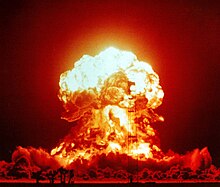

- To imply by the word "terrorism" that this sort of terror is the work exclusively of "terrorists" is misleading. The "legitimate" warfare of technologically advanced nations likewise is premeditated, politically motivated violence perpetrated against innocents. The distinction between the intention to perpetrate violence against innocents, as in "terrorism," and the willingness to do so, as in "war," is not a source of comfort.
- Much of the obscurity of our effort so far against terrorism originates in the now official idea that the enemy is evil and that we are (therefore) good, which is the precise mirror image of the official idea of the terrorists.
- One cannot reduce terror by holding over the world the threat of what it most fears.
- We cannot hope to be secure when our government has declared, by its readiness "to act alone," its willingness to be everybody's enemy.
- After World War II, we hoped the world might be united for the sake of peacemaking. Now the world is being "globalized" for the sake of trade and the so-called free market — for the sake, that is, of plundering the world for cheap labor, cheap energy, and cheap materials. How nations, let alone regions and communities, are to shape and protect themselves within this "global economy" is far from clear.
- Our Constitution, by its separation of powers and its system of checks and balances, acts as a restraint upon efficiency by denying exclusive power to any branch of government. The logic of governmental efficiency, unchecked, runs straight on, not only to dictatorship, but also to torture, assassination, and other abominations.
- On eroding, ecologically degraded, increasingly toxic landscapes, worked by failing or subsidy-dependent farmers and by the cheap labor of migrants, we have erected the tottering tower of "agribusiness," which prospers and "feeds the world" (incompletely and temporarily) by undermining its own foundations.
- If we are serious about peace, then we must work for it as ardently, seriously, continuously, carefully, and bravely as we have ever prepared for war.
The Failure of War
[edit]



- If you know even as little history as I do, it is hard not to doubt the efficacy of modern war as a solution to any problem except that of retribution — the “justice” of exchanging one damage for another.
- National defense through war always involves some degree of national defeat. This paradox has been with us from the very beginning of our republic. Militarization in defense of freedom reduces the freedom of the defenders. There is a fundamental inconsistency between war and freedom.
- In a modern war, fought with modern weapons and on the modern scale, neither side can limit to “the enemy” the damage that it does. These wars damage the world. We know enough by now to know that you cannot damage a part of the world without damaging all of it. Modern war has not only made it impossible to kill “combatants” without killing “noncombatants,” it has made it impossible to damage your enemy without damaging yourself.
- Our century of war, militarism, and political terror has produced great — and successful — advocates of true peace, among whom Mohandas Gandhi and Martin Luther King, Jr., are the paramount examples. The considerable success that they achieved testifies to the presence, in the midst of violence, of an authentic and powerful desire for peace and, more important, of the proven will to make the necessary sacrifices.
- We cling in our public life to a brutal hypocrisy. In our century of almost universal violence of humans against fellow humans, and against our natural and cultural commonwealth, hypocrisy has been inescapable because our opposition to violence has been selective or merely fashionable. Some of us who approve of our monstrous military budget and our peacekeeping wars nonetheless deplore “domestic violence” and think that our society can be pacified by “gun control.” Some of us are against capital punishment but for abortion. Some of us are against abortion but for capital punishment.
- Violence breeds violence. Acts of violence committed in “justice” or in affirmation of “rights” or in defense of “peace” do not end violence. They prepare and justify its continuation.
- What could be more absurd, to begin with, than our attitude of high moral outrage against other nations for manufacturing the selfsame weapons that we manufacture? The difference, as our leaders say, is that we will use these weapons virtuously, whereas our enemies will use them maliciously — a proposition that too readily conforms to a proposition of much less dignity: we will use them in our interest, whereas our enemies will use them in theirs.
- I think we must be careful about too easily accepting, or being too easily grateful for, sacrifices made by others, especially if we have made none ourselves.
- Let us have the candor to acknowledge that what we call “the economy” or “the free market” is less and less distinguishable from warfare. For about half of the last century, we worried about world conquest by international communism. Now with less worry (so far) we are witnessing world conquest by international capitalism. Though its political means are milder (so far) than those of communism, this newly internationalized capitalism may prove even more destructive of human cultures and communities, of freedom, and of nature. Its tendency is just as much toward total dominance and control.
- We are disposed, somewhat by culture and somewhat by nature, to solve our problems by violence, and even to enjoy doing so. And yet by now all of us must at least have suspected that our right to live, to be free, and to be at peace is not guaranteed by any act of violence. It can be guaranteed only by our willingness that all other persons should live, be free, and be at peace — and by our willingness to use or give our own lives to make that possible.
- It is useless to try to adjudicate a long-standing animosity by asking who started it or who is the most wrong. The only sufficient answer is to give up the animosity and try forgiveness, to try to love our enemies and to talk to them and (if we pray) to pray for them. If we can't do any of that, then we must begin again by trying to imagine our enemies' children who, like our children, are in mortal danger because of enmity that they did not cause.
The Total Economy
[edit]- A corporation, essentially, is a pile of money to which a number of persons have sold their moral allegiance. Unlike a person, a corporation does not age. It does not arrive, as most persons finally do, at a realization of the shortness and smallness of human lives; it does not come to see the future as the lifetime of the children and grandchildren of anybody in particular.
Watershed and Commonwealth
[edit]- People who live at the lower ends of watersheds cannot be isolationists — or not for long. Pretty soon they will notice that water flows, and that will set them to thinking about the people upstream who either do or do not send down their silt and pollutants and garbage. Thinking about the people upstream out to cause further thinking about the people downstream. Such pondering on the facts of gravity and the fluidity of water shows us that the golden rule speaks to a condition of absolute interdependency and obligation. People who live on rivers — or, in fact, anywhere in a watershed — might rephrase the rule in this way: Do unto those downstream as you would have those upstream do unto you.
The Way of Ignorance (2005)
[edit]
- In the effort to tell a whole story, to see it whole and clear, I have had to imagine more than I have known.
- "Imagination in Place"
- The most insistent and formidable concern of agriculture, wherever it is taken seriously, is the distinct individuality of every farm, every field on every farm, every farm family, and every creature on every farm.
- "Imagination in Place"
- To farm is to be placed absolutely.
- "Imagination in Place"
- The ability to speak exactly is intimately related to the ability to know exactly.
- "Imagination in Place"
Given (2005)
[edit]Sabbaths 2001
[edit]

Is half or more a ruined mind.

larger creatures are hungry.
- Ask the world to reveal its quietude —
not the silence of machines when they are still,
but the true quiet by which birdsongs,
trees, bellworts, snails, clouds, storms
become what they are, and are nothing else.
- A mind that has confronted ruin for years
Is half or more a ruined mind.
- Sit and be still
until in the time
of no rain you hear
beneath the dry wind's
commotion in the trees
the sound of flowing
water among the rocks,
a stream unheard before,
and you are where
breathing is prayer.
- Small creatures die because
larger creatures are hungry.
How superior to this
human confusion of greed
and creed, blood and fire.
Standing by Words: Essays (2011)
[edit]Poetry and Marriage: The Use of Old Forms (1982)
[edit]- There are, it seems, two Muses: the Muse of Inspiration, who gives us inarticulate visions and desires, and the Muse of Realization, who returns again and again to say, “It is yet more difficult than you thought.” This is the muse of form. The first muse is the one mainly listened to in a cheap-energy civilization, in which “economic health” depends on the assumption that everything desirable lies within easy reach of anyone. To hear the second muse one must move outside the cheap-energy enclosure. It is the willingness to hear the second muse that keeps us cheerful in our work. To hear only the first is to live in the bitterness of disappointment.
- It may be, then, that form serves us best when it works as an obstruction to baffle us and deflect our intended course. It may be that when we no longer know what to do we have come to our real work and that when we no longer know which way to go we have begun our real journey. The mind that is not baffled is not employed. The impeded stream is the one that sings.
Caretaking by Wendell Berry and Helena Norberg-Hodge, Orion Magazine, (12 March 2019)
[edit]- What one has to say to begin with is that, as humans, we are limited in intelligence and we really have no reliable foresight. So none of us will come up with answers to the whole great problem. What we can do is judge our behavior, our history, and our present situation by a better standard than “efficiency” or “profit,” or those measures that we’re still using to determine economic decisions.
- The standard that I always come back to is the health of the world, which is the same as our own personal health. We can’t distinguish our health from the health of everything else. And we know enough from the ecologists now to know that health is a very complex and un-understandable complexity of relationships that makes the world whole.
- One of the roots of the problem is the focus of environmentalists. The conservation movement, for one hundred years, has, at least in this country, focused on wilderness preservation—places of spectacular rocks and waterfalls—at the expense of what I would call the “economic landscapes” of farming, forestry, and mining.
- The politicians have kept the environmental movement quiet by designating wilderness areas. And in the meantime, they’ve let corporations run completely out of control, and extraordinarily destructively, in the economic landscapes, without any acknowledgement at all that the natural world is out there just the same as it is in the parks.
- Small farms make economic sense. They also produce more happiness, more beauty, more health—those things that aren’t so quantifiable...
- There’s far too much generalization now about rural America. Conservatives and corporations have had their eye on rural America all along. And they’ve been turning it into money as fast as they can, which is to say destroying the land and the people...
- The problem is that rural America has been a colony, certainly throughout my lifetime. I don’t think anybody’s paid attention to rural America since about 1945 or ’50. Certainly not since 1952, when Eisenhower’s Secretary of Agriculture said to the farmers: “Get big or get out.” They’ve just abandoned rural America to corporations and technologies.
Poems
[edit]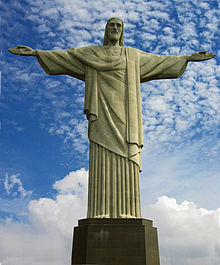






- Let me say
and not mourn: the world
lives in the death of speech
and sings there.- The Silence
- Do not think me gentle
because I speak in praise
of gentleness, or elegant
because I honor the grace
that keeps this world. I am
a man crude as any,
gross of speech, intolerant,
stubborn, angry, full
of fits and furies. That I
may have spoken well
at times, is not natural.
A wonder is what it is.- A Warning To My Readers
- The poem is important, but
not more than the people
whose survival it serves...- In A Motel Parking Lot, Thinking Of Dr. Williams
- Love the quick profit, the annual raise,
vacation with pay. Want more
of everything ready-made. Be afraid
to know your neighbors and to die.
And you will have a window in your head.
Not even your future will be a mystery
any more. Your mind will be punched in a card
and shut away in a little drawer.
When they want you to buy something
they will call you. When they want you
to die for profit they will let you know.So, friends, every day do something
that won't compute. Love the Lord.
Love the world. Work for nothing.
Take all that you have and be poor.
Love someone who does not deserve it.
Denounce the government and embrace
the flag. Hope to live in that free
republic for which it stands.
Give your approval to all you cannot
understand. Praise ignorance, for what man
has not encountered he has not destroyed.
- "Manifesto: The Mad Farmer Liberation Front" in Farming: A Hand Book (1970)
- Ask the questions that have no answers.
Invest in the millenium.- "Manifesto: The Mad Farmer Liberation Front" in Farming: A Hand Book (1970)
- Laugh.
Laughter is immeasurable. Be joyful
though you have considered all the facts.- "Manifesto: The Mad Farmer Liberation Front" in Farming: A Hand Book (1970)
- As soon as the generals and the politicos
can predict the motions of your mind,
lose it. Leave it as a sign
to mark the false trail, the way
you didn't go.Be like the fox
who makes more tracks than necessary,
some in the wrong direction.
Practice resurrection.- "Manifesto: The Mad Farmer Liberation Front" in Farming: A Hand Book (1970)
- To be sane in a mad time
is bad for the brain, worse
for the heart.- "The Mad Farmer Manifesto: The First Amendment" in The Country of Marriage (1973)
- What I stand for
is what I stand on.- "Below" in A Part (1980)
- From the union of power and money,
from the union of power and secrecy,
from the union of government and science,
from the union of government and art,
from the union of science and money,
from the union of ambition and ignorance,
from the union of genius and war,
from the union of outer space and inner vacuity,
the Mad Farmer walks quietly away.- "The Mad Farmer, Flying the Flag of Rough Branch, Secedes from the Union" in Entries (1997)
External links
[edit]- Mr. Wendell Berry of Kentucky Extensive links to material by or about Wendell Berry
- Wendell Berry Academy of American Poets
- The Failure of War at CommonDreams.org
- Thoughts in the Presence of Fear at Orion online.
- Compromise, Hell! Essay at Orion online.
- Wendell Berry poetry online at Plagiarist.com
- Many Wendell Berry quotes at FireAndKnowledge.org
Categories:
- Academics from the United States
- Poets from Kentucky
- Novelists from Kentucky
- Essayists from the United States
- Short story writers from the United States
- Critics from the United States
- Cultural critics
- Activists from the United States
- Social activists
- Environmentalists
- Baptists from the United States
- Pacifists
- 1934 births
- Living people
- Philosophers from the United States
- Farmers


